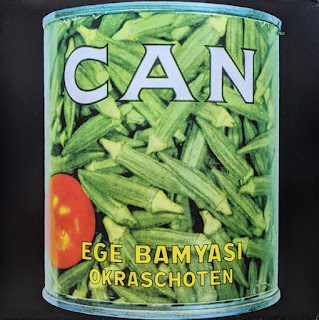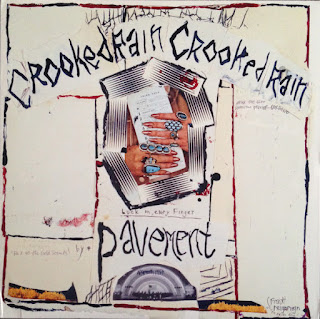Can - Ege Bamyasi (Album Review)
Can - Ege Bamyasi
(1972)
My copy: 2014 remastered reissue by Spoon Records and Mute.
Bolstered by the new standards of Tago Mago as well as some mainline success with their popular single “Spoon,” Can settled beautifully into a fusion of timeless experimentation and rich, mysterious melodies influenced greatly by eastern cultures on the opus that is Ege Bamyasi. Nestled snugly in between their two other most influential records, Tago Mago and Future Days, Ege Bamyasi retains the best of the apocalyptic energy of the former while setting the stage for the mellower, groove-oriented structures of the latter.
“Pinch” is one of the greatest album openers of all time, diving instantly into one of Jaki Liebezeit’s integral shuffle beats, as eerie feedback fills out the edges of the composition with a phantom atmosphere. Can were undoubtedly playing a different game than any other band of their era - using furious percussion as a sturdy skeleton for other instruments to occasionally cling to: the guitars prod and swing at their own leisure though everything sticks firmly to the tight pace set by the rhythm section. Damo Suzuki’s tasteful melodrama is the perfect compliment to the band’s erratic songwriting, switching from confident whispers to menacing growls while retaining a genuine talent for harmony. On their longer pieces, Can plays a form of guerilla music - with a never ending feeling of suspense in their withholding of obvious melodies, instead relying on subtle and mysterious jabs to lead into sudden bursts of pressure: all this made possible by the drums of Liebezeit and Holger Czukay’s bass playing.
Then comes “Sing Swan Song,” which glides so peacefully that the nervous, quietly droning keys might pass over you like a dark cloud on a still evening. There are haunting swirls of both guitar and keys, with rebellion usually dying down under cymbal swells. “One More Night” chains off-kilter funk grooves to a locked 7 / 8 time signature, with sprinkled melodies contrasting Suzuki’s animalistic vocals. “Vitamin C” is their enigmatic pop masterpiece, with Suzuki’s ear-worm vocals lashing over drum fills and patient walls of guitar - eventually dissolving in an acid-bath of keyboard melodies that flow directly into the longest song, “Soup.”
Starting in near silence, “Soup” again tackles jazz and funk when it revives, picking up bold chords with powerful distortion for the first time on the album. The bass is key here; as the track picks up speed into a belt of syncopation and anxiety, toppling over and crashing down into flames with bass scales. It is here, partway through “Soup,” that they most borrow from the noise experiments of Tago Mago, painting a devilish wasteland of crackling distortion and fluctuating keys - the sound combines shockingly futuristic tones with elements of free jazz, deconstructing and rebuilding itself around Suzuki’s crazed tongue-speaking. The only issue is just how many times “Soup” seems to feign its death, as its sonic exploration is much more interesting when it is consistent.
Then, as if nothing at all had happened, the band switches into the cool strut of “I’m So Green,” where the bass again takes the reins, leading the song into a punchy bridge with howling guitar and keys. Finally, “Spoon” is the most typical kraut-rock song of the bunch with a metronome beat and buzzing staccato synth chords, showing off Can’s signature skill of manipulating instruments to produce delightfully uncanny results. I only wish these final two jam sessions lasted longer before fading off. The sequencing is a bit odd for situating “Soup” near the middle, but Ege Bamyasi is still easily an incredible and influential record.
Though it took some time for their appeal to widen, the residual effects Can had on modern alternative music cannot be understated. While many bands sought to emulate their style, others often failed to understand the delicate balance that goes into the creation of a record like Ege Bamyasi - with even the noise segments being the result of carefully executed arrangements. Can are the foremost rock musicians of their time, rejecting conventions not out of ignorance but from a place of exceptional knowledge. The innocent can of okra on the album’s cover is the perfect façade for such an elaborate piece: it appears simply as a crude joke on the surface, but peeling back the lid reveals a true masterpiece.




Comments
Post a Comment